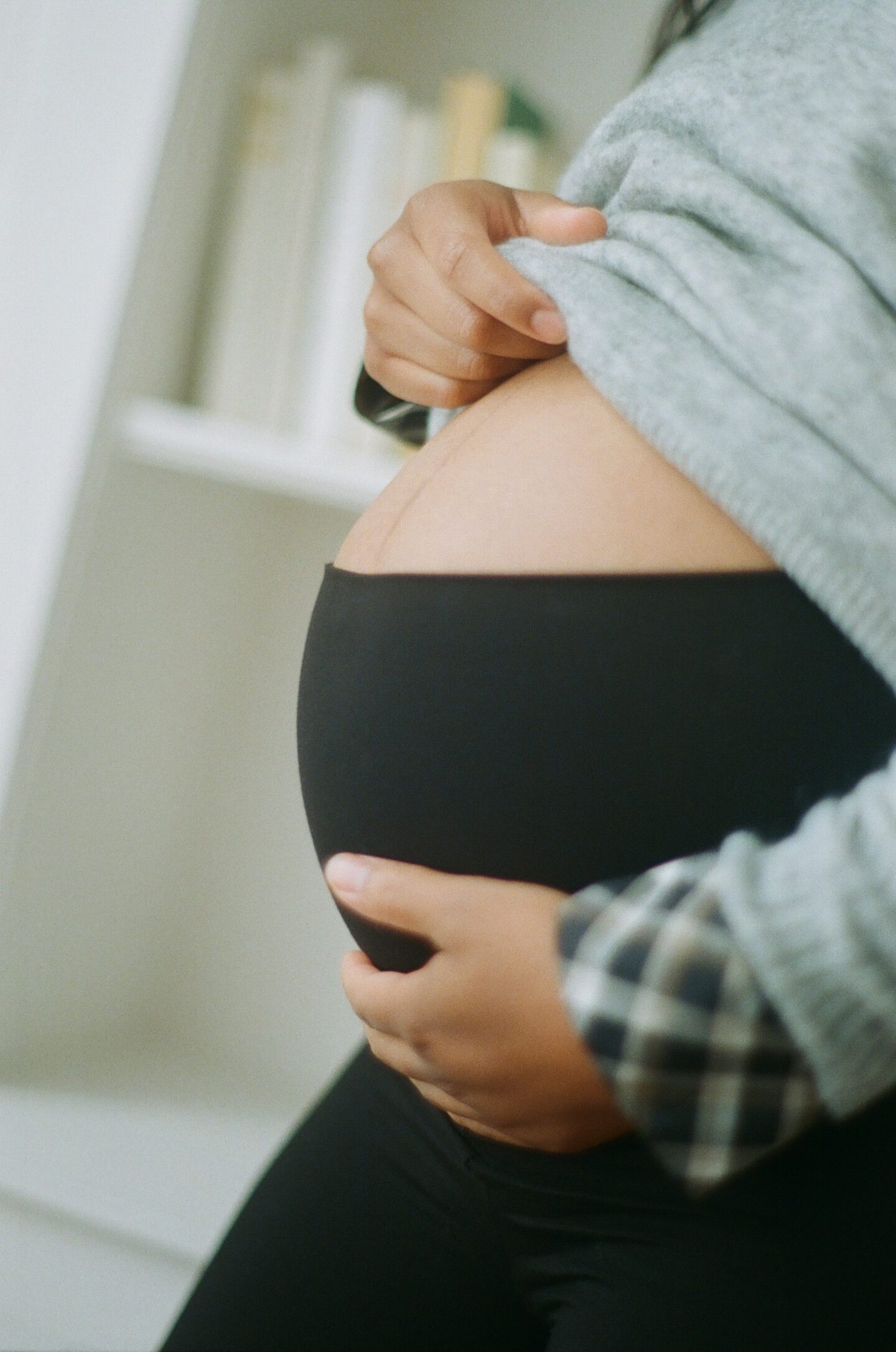We’ve all been there: your favorite maternity nightgown is on, the lights are off, and you’re finally ready for bed when all of the sudden you flip over from your usual sleeping position in a panic, wondering — is it okay to sleep on my stomach while pregnant?
The answer depends a bit on where you’re at in your pregnancy journey, but even if you’re a chronic stomach sleeper, we have a solution for you.
Keep reading for all of your questions about sleeping positions while pregnant answered below.
Is It Safe To Sleep on My Stomach While Pregnant?
The answer is yes —maybe. It turns out the science is a bit mixed when it comes to stomach sleeping.
We for sure know that stomach sleeping is okay through the first trimester when your baby bump is still small. According to experts at the Ohio State Wexner Medical Center and Stanford Children’s Hospital, stomach sleeping is okay for the first 16 to 18 weeks of pregnancy. Up until this point, you’ll likely be able to sleep comfortably in your usual sleeping position.
Sleeping in the Second Trimester
But starting a few weeks into the second trimester, things change. As your baby bump grows, you’ll find it more and more uncomfortable to lay on your belly — your little babe is starting to take up a lot more room. Even if you were a religious stomach sleeper before pregnancy, you’d likely have to find another option around the 16-week mark.
You might be tempted to flip to your back, but hold your horses. There are more reasons than your own comfort to avoid stomach sleeping into the second and third trimester — and those same reasons apply to back sleeping as well.
Stomach Sleep and Blood Vessels
Some scientific studies have indicated that sleeping on your back or tummy can compress major blood vessels, including the aorta and vena cava. (The aorta is a major artery and carries oxygenated blood; the vena cava is a large vein that carries deoxygenated blood from your lower body into your heart.)
Both the aorta and vena cava are critically important for maintaining the balance of oxygen and carbon dioxide in your blood, and laying on your expanding belly might constrict these veins in risky ways.
When the vena cava is compressed, it can slow the removal of that deoxygenated blood and cause nausea and shortness of breath. Some studies have also suggested it may limit blood flow to the fetus.
However, another recent study found significant room for error in the report that connected back sleeping and stomach sleeping with complications. The scientists behind the dissenting 2019 study reported that they believe there is likely no connection between complications and sleeping position. They also reported the first study could have been impacted by participant bias.
TBD: Research Is Ongoing
So what’s the right answer? The scientific community has not reached a consensus on the issue of stomach sleeping during pregnancy. There likely will be a lot of back and forth over this issue in the next few years while more studies are conducted.
Out of an abundance of caution, you might want to switch to side sleeping once you’ve reached the second trimester.
What’s the Best Sleeping Position While Pregnant?
Once you reach the second trimester and that baby bump starts taking up a lot more real estate, it can be more of a struggle to get comfortable in bed. Try transitioning to side sleeping before you absolutely have to, so you can get used to the new position over time.
Left Side Best Side?
Doctors particularly recommend sleeping on your left side. This practice can possibly improve kidney function and allow for good blood flow to the fetus (although sleeping on your right side is a good option as well).
Opt for a Pregnancy Pillow
If you’re a chronic stomach sleeper and you’re struggling to get comfortable on your left side, try supporting yourself with pillows! You can try putting a pillow between your knees or using a pregnancy pillow to prop up your back and hips. Using pillows to support yourself while you sleep can be especially helpful in mediating back pain and other pregnancy-related aches and pains.
Work on Sleep Hygiene
Other strategies that can help you get that all-important shut-eye during pregnancy include practicing good sleep hygiene or daily habits that promote uninterrupted sleep. Make sure that your room is dark, kept at a comfortable temperature, and relaxing around bedtime. Try out relaxation techniques before bed, such as reading, journaling, or meditation.
Consider investing in quality pregnancy pillows or PJs that you love — splurging is definitely worth it when it comes to your sleep during this time. After all, you’re sleeping for two!
Incorporate Pregnancy Nighttime Self-Care Practices
You might also try creating a relaxing ritual before bedtime each night. For instance, nightly massaging oil into your baby bump can let your brain know that it’s time to wind down and get ready for sleep. Removing any electronics from your room can help promote solid sleep by preventing the mindless bedtime scroll.
It turns out there are a bunch of things you can do to set yourself up for a good night’s sleep, just by making your bedroom an oasis for relaxation and sleep! And, of course, if you’ve tried out seemingly every strategy and still can’t get comfortable, talk to your obstetrician. They may have some helpful suggestions for helping you get some shut-eye, even without sleeping on your stomach.
I’m Pregnant, and I Can’t Sleep. What’s Going On?
Switching from stomach sleeping to sleeping on your side isn’t the only factor that may prevent you from getting a good night’s rest. Even though getting quality sleep is more important than ever during pregnancy, there are a lot of factors that can contribute to sleeping poorly while preggo — it’s a classic paradox of pregnancy. Lucky us!
Common pregnancy conditions like backaches, morning sickness, and having to pee every 30 minutes can interrupt your sleep, as can more serious concerns, like gestational diabetes and sleep apnea. Be sure to pay attention to what you’re experiencing, and talk to your obstetrician if you think it may be more serious than everyday pregnancy symptoms.
Physical and Hormonal Changes That Disrupt Sleep
Tons of physical and hormonal changes take place during pregnancy, so it makes sense that your nightly slumber is being disturbed, especially into the second and third trimester as your due date approaches. During pregnancy, your progesterone and estrogen levels spike, both of which can cause sleepiness and other conditions that contribute to fatigue.
For example, increased estrogen levels can cause the mucus membranes in your nose to swell, congesting your airways (potentially causing sleep apnea during pregnancy). Oxytocin, the hormone responsible for uterine cramping, typically peaks in the night — say hello to disrupted sleep, especially in the third trimester.
Ask for Professional Help
If you find yourself chronically restless or unable to get to sleep at night, definitely talk to your OB/GYN or another healthcare provider. Trouble sleeping is common during pregnancy, but that doesn’t mean it’s not fixable.
Not sleeping has an annoying circular effect. When we don’t sleep, we stress about not being able to sleep, making us even less likely to sleep due to ~anxiety~. Ugh.
Plus, nothing makes sleep extra worse than Googling “how to get to sleep please ASAP” at 3 AM and getting all that excess digital, sleep-disrupting blue light exposure. Being gentle with ourselves, using our sleep routines, and most importantly, asking for help are best. Remember, you are trying to support a growing human, which is amazing in and of itself.
There might not be a consensus in the scientific community about stomach sleeping during late pregnancy. Scientists are pretty sure that sleeping on your side during the second and third trimester is generally safe. So once you reach that 16 to 18-week mark, switch to your side — and don’t be afraid to incorporate whatever sleeping strategies you need to get those precious zzz’s.
Sources:







